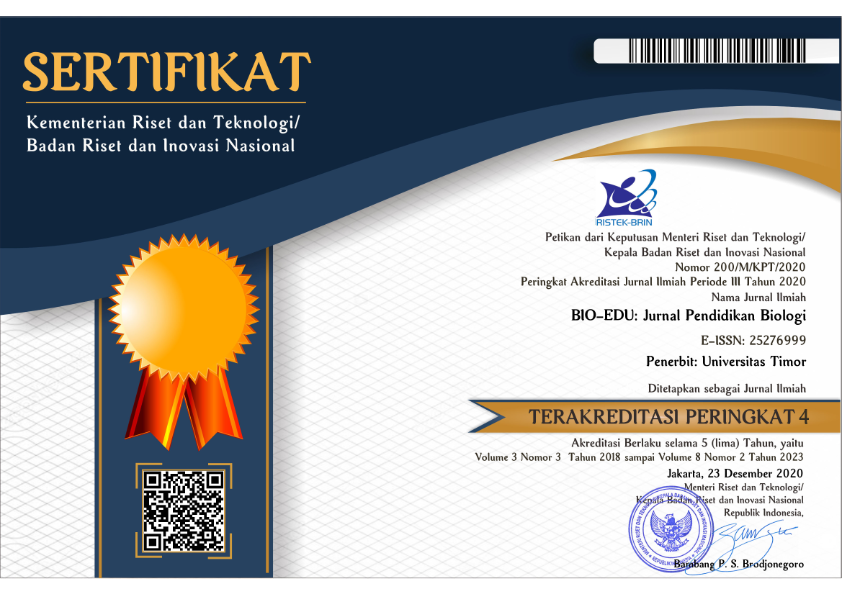Pengaruh Kemampuan Literasi Digital Terhadap Efikasi Diri dan Kemandirian Belajar Siswa
DOI:
https://doi.org/10.32938/jbe.v8i3.3824Keywords:
Digital literacy skill,, Self-efficacy,, Student learning independen.Abstract
The existence of digital technology in education requires digital literacy so that technology can be used optimally. Self-efficacy and student learning independence are very important for students to support learning. The purpose of this research is to describe the effect of digital literacy skills on students' self-efficacy and learning independence. This research is a type of quantitative research. The sampling technique uses a saturated sampling technique with a population of class XI IPA 1 and 2 MA Futuhiyah Jeketro and data collection uses a questionnaire. Testing the hypothesis using the regression test and test the coefficient of determination. The results showed: 1. Digital literacy skills have an effect on self-efficacy with a significance of 0.001 <0.05 and a large effect of 27.7%; 2. Digital literacy skills affect student learning independence with a significance of 0.031 <0.05 and a large influence of 12%.
References
Anam, Khairul, Mulasi, S., dan Syarifah, R. (2021). Efektifitas Penggunaan Media Digiyal dalam Proses Belajar Mengajar. Genderang Asa: Journal Of Primary Education, 2 (2), 76-87
Anggeraini,Yentri, Abdurrachman, F., Mujiyanto, J., & Bharati, D. A. L. (2019). Literasi Digital : Dampak dan tantangan dalam pembelajaran bahasa, Prosiding Seminar Nasional Pascasarjana UNNES : 386-389
Asrori (2020). Psikologi Pendidikan Pendekatan Multidisilpiner. Jawa Tengah: CV. Pena Persada.
Bandura, A. (1997). Self-Efficacy: The Excercice of Control. New York: W. H. Freemanand Company.
Carretero, S., Vuorikari, R., & Punie, Y. (2017). DigComp 2.1 :The Digital Competence Framework for Citizens with eight proficiency levels and example of use. Publication Office of the European Union.
Dewi, Sonia Rizqi (2021). Analisis Kemandirian Belajar pada Proses Pembelajaran Kimia Melalui Blended Learning di Masa Pandemi. Universitas Islam Negeri Walisongo Semarang.
Hague, C. & Payton, S. (2010). Digital Literacy Across the Curriculum. Bristol: Futurelab.
Haliza, Nur. (2022). Pengaruh Literasi Digital, Efikasi diri dan Ekspektasi Pendapatan Terhadap Minat Berwirausaha Pada Mahasiswa Fakultas Ekonomi Universitas Negeri Jakarta Angkatan 2017. Indonesian Journal of Economy, Business, Entrepreneuship and Finance, 2 (2), 172-186 https://doi.org/10.53067/ijebef.v2i2
Maritsa, Ana, Salsabila, U. H., Wafiq, M., Anindya, P. R., Ma’shum, M. A. (2021) Pengaruh Teknologi Dalam Dunia Pendidikan. Al-Muthaharah: Jurnal Penelitian Dan Kajian Sosial Keagamaan, 18(2), 91-100
Nika, Sarah, Hidayat, N., & Laihad, G. H. (2022). Peningkatan Literasi Digital Melalui Penguatan Efikasi Diri dan Kepemimpinan Visioner. 10 (2), 88-93 DOI: https://doi.org/10.33751/jmp.v10i2.6102
Rianto, P. (2016). Media Baru, Visi Khalayak Aktif Dan Urgensi Literasi Media. Jurnal Komunikasi Ikatan Sarjana Komunikasi Indonesia, 1(2), 90. doi:10.25008/jkiski.v1i2.54.
Sugiyono (2013). Metode Penelitian Kuantitatif, Kualitatif, dan R&D. Bandung: Alfabeta.
Wahyuni, A., Sari, N. K., & Sutrisno, T. (2021). Pengaruh Literasi Digital Terhadap Kemandirian Belajar Siswa Sekolah Dasar Negeri 02 Ngadiluwih Kecamatan Matesih Kabupaten Karanganyar Tahun Pelajaran 2020/2021. Edustream: Jurnal Pendidikan Dasar, 5(2), 118-124
Downloads
Published
Issue
Section
License
The Authors submitting a manuscript do so on the understanding that if accepted for publication, the copyright of the article shall be assigned to BIO-EDU: Jurnal Pendidikan Biologi and Departement of Biology Education, Universitas Timor as the publisher of the journal. Copyright encompasses rights to reproduce and deliver the article in all form and media, including reprints, photographs, microfilms, and any other similar reproductions, as well as translations.
BIO-EDU journal and Departement Biology Education, Universitas Timor, and the Editors make every effort to ensure that no wrong or misleading data, opinions, or statements be published in the journal. In any way, the contents of the articles and advertisements published in BIO-EDU are the sole and responsibility of their respective authors and advertisers.
Users of this website will be licensed to use materials from this website following the Creative Commons Attribution-ShareAlike 4.0 International License.



















